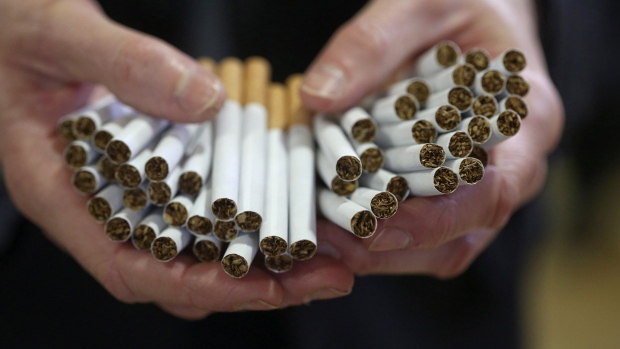Mar 4, 2019
BAT, Philip Morris to appeal Quebec ruling against Big Tobacco
, Bloomberg News

British American Tobacco Plc and Philip Morris International Inc. plan to fight a Canadian legal decision that could threaten the tobacco industry’s existence in the country.
The Canadian units of BAT, Philip Morris and Japan Tobacco Inc. were ordered Friday to pay damages of about $17 billion after losing an appeal of class actions filed by Quebec smokers.
If Big Tobacco loses this battle, cigarette makers will probably need to put their Canadian units into administration, according to Adam Spielman, an analyst at Citigroup. The companies face even more possible penalties as Canada’s 10 provinces are also suing the tobacco industry to recover healthcare costs, he said.
The Quebec Court of Appeal upheld a lower-court decision with minor changes, according to the ruling released Friday. The lawsuits were in favor of smokers seeking damages for addiction and smoking-related diseases, who argued they were never warned of the risks.
‘Disappointing’ Judgement
“Today’s judgment is disappointing,” said Eric Gagnon, the head of corporate and regulatory affairs for BAT’s Imperial Tobacco Canada Ltd. unit, which plans to bring the case to the country’s Supreme Court. “The risks associated with smoking have been known in Canada for decades. Consumers were aware and that’s why we think we shouldn’t be held responsible.”
Rothmans, Benson & Hedges Inc., the Canadian unit of Philip Morris, also said it plans to appeal. Japan Tobacco said JTI-MacDonald Corp., the other defendant in the cases, is considering all options.
In the 2015 ruling, Imperial Tobacco Canada was ordered to pay about $10.5 billion, while Rothmans and JTI-MacDonald faced $3.1 billion and $2 billion fines respectively. BAT has made a $758 million payment in escrow.
The federal government may eventually need to step in to negotiate a settlement, because if legal cigarette manufacturers go under, the country would face the risk of a boom in illicit tobacco, Citigroup’s Spielman said. BAT traded 0.4 per cent higher at 10:18 a.m. in London, erasing an earlier drop of as much as 1 per cent.
U.S. Ruling
The decision comes a week after the U.S. Supreme Court turned away the tobacco industry’s effort to derail lawsuits by thousands of Florida smokers. Tobacco companies have been undergoing a major shift as they try to lower their reliance on traditional cigarettes, seeking a future with alternative products as smoking demand wanes and countries tighten regulations.
In the U.S. Supreme Court case, the tobacco companies said they face another 2,300 pending suits. The companies argue that smokers shouldn’t be able to rely on a jury’s factual findings in a class-action case against the industry 20 years ago. Lower courts have said many of those findings, including the conclusion that the companies conspired to conceal the dangers of smoking, can serve as the starting point for individual suits.
The Quebec cases stem from lawsuits originally filed in 1998 and involved the first damages against the industry in Canada. The decision comes four years after the ruling against the companies by a trial court in Quebec. The original damages were set at about $15.5 billion, though that has risen to about $17 billion with interest charges, according to estimates from the Canadian Cancer Society.
Disease, Death
“This is a complete and resounding defeat for the tobacco industry,” said Rob Cunningham, senior policy analyst for the Ottawa-based cancer group. The industry “has engaged in decades of wrongful behavior resulting in vast suffering, disease and death.”
The legal battle will probably continue for many years as it’ll probably be up to the Canadian Supreme Court to decide, Finance Director Ben Stevens said on a results call Thursday when asked to comment on the imminent decision.
Japan Tobacco shares fell 1.2 per cent in Tokyo.


